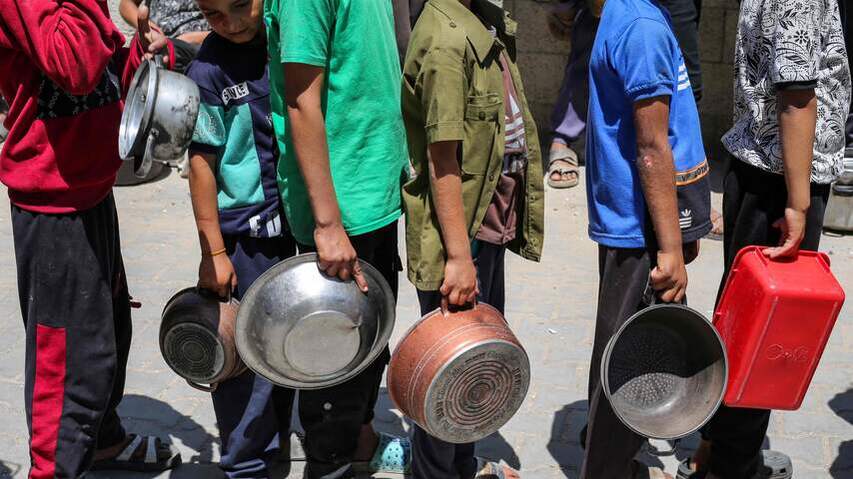
The situation in Gaza is getting worse due to increasing hunger and Israeli bombings. NU.nl spoke with two Palestinians in the area, who feel great despair. “Every day is worse than the day before.”
Hopeless, that’s the best way to describe the situation. Both men with whom NU.nl is in contact send messages and voice recordings via WhatsApp about their lives in the Gaza Strip. Calling is not possible, because the connection is too bad. They prefer not to share photos. Their messages have one common denominator: they don’t know when there will finally be improvement.
Mustafa, 33, lives in the north of Gaza. There he is a street artist, affiliated with the HOPE Foundation. The foundation’s goal is to teach children in conflict areas how to deal with war through art and culture.
Mustafa regularly shares images on his Instagram page: of his art, his work with the children or of the rubble from the war.
“Life in Gaza has become very complicated,” Mustafa says. “I don’t know where to start. There is a money crisis, a water crisis, a food crisis.”
‘I Fear for the Coming Days’
Mustafa can still get food for his family on the market, but that is very expensive and must be paid with cash.
Gaza has been struggling with a major shortage of cash for several months, partly because Israel has destroyed many banks. If he wants to get cash, Mustafa has to pay 35 percent extra, he says.
“I fear for the coming days, for when Israel expands the operation even further,” says Mustafa. The Israeli government started a major ground offensive this week. The country wants to take over all of Gaza and is trying to force Palestinians to other places with the attacks. Hundreds of Palestinians have been killed in the past week.
“I am afraid that it will be just as much of a bloodbath as before,” says Mustafa, referring to the beginning of the conflict. He also fears what the further increasing food scarcity will bring.
Stacked bodies
He looks back on a year and a half ago, when Israel first blocked emergency aid and the supply of food to Gaza. “My cousins and I had to go out to get food,” he says. That journey was risky because the area where they lived was constantly bombed. It was raining hard and Mustafa was soaked up to his knees.
On the way he saw a donkey-drawn cart with a tarpaulin. Underneath were stacked bodies: “A pile of meat”. “I looked up at the sky and cried while I was stuck in the mud,” says Mustafa. “I was still on my way to get food for my twenty family members. And I wondered if I would survive, or if I would return as a corpse, as I saw on that cart.”
He is discouraged, says Mustafa. “I don’t know how to continue with my life. I can only think about the near future.”
That hopelessness also characterizes the story of Karam, owner of an international language school. NU.nl spoke to him a year and a half ago, a few days after Israel closed off the Gaza Strip from electricity, food and fuel for the first time since this war. You can read that story here.
‘Every day is worse than the day before’
Hundreds of people had already been killed by the Israeli army’s bombings. Karam’s language school has since become unusable due to the attacks.
In the past year and a half, he fled several times from Rafah to Khan Younis and back again, while continuing to give English lessons to children where he could. A few days ago he had to leave Khan Younis again during a large-scale evacuation. That was on the orders of the Israeli army in preparation for the attacks it is currently carrying out.
On the way, Karam sends a voice message while he waits for a driver who can take him, his four children, wife and parents to a new place to stay. “I just finished preparing for everything. My children are sleeping now and we are also trying to sleep. It is so difficult and hard,” he says.
‘Before the war I Knew That Every Day Could Get Better’
Karam feels great despair. “I hope this is over soon. Enough is enough.” Then it remains silent for four minutes before he closes his message.
In another message Karam says: “Every day is worse. We get up early every day hoping to be able to make some food, but usually there is no food. And if we do see food, it is far too expensive to buy it.”
There is a shortage of everything, he also says. It makes him distraught. “Before the war I knew: every day can be better than today. We could always make new plans for the future, look ahead. But now I know that every day looks even worse than the day before.”
It is necessary for Israel to allow more emergency aid, says Mustafa. But not only that. “We miss a normal life. Our greatest dream is to lead a safe and normal life. That is all.”